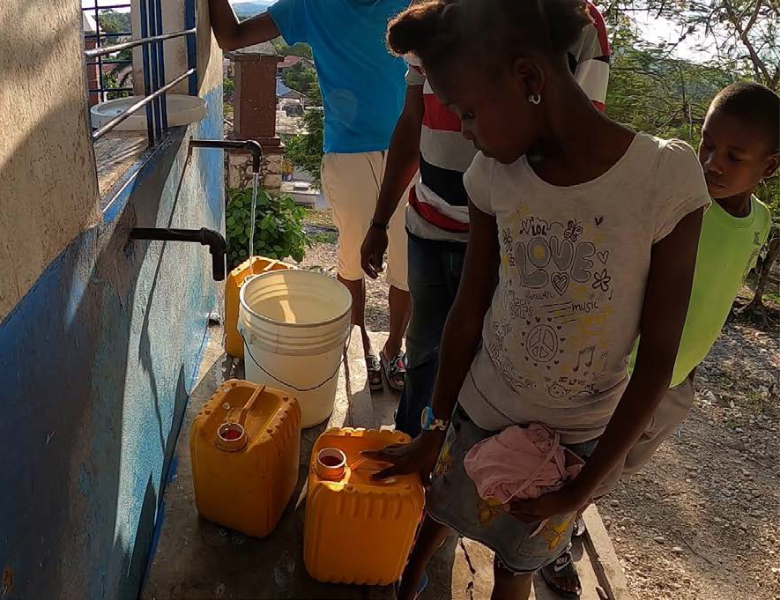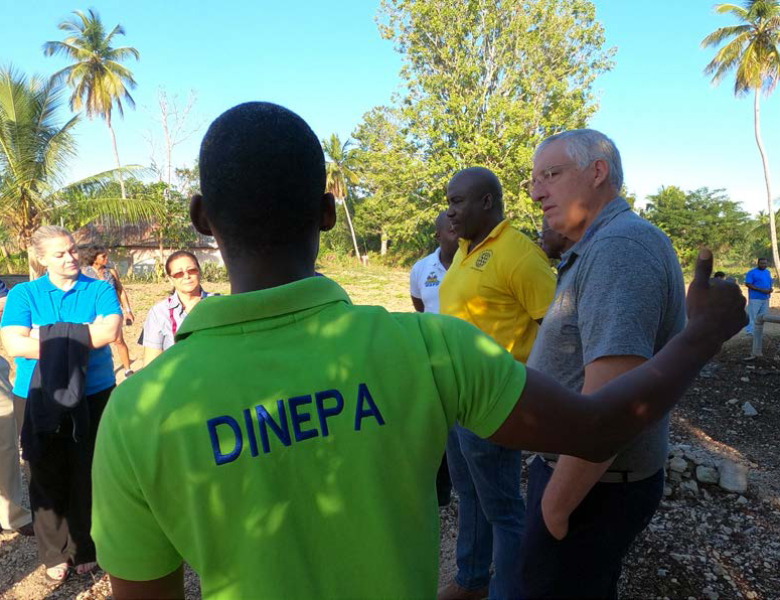THE LANDSCAPE
HAITI
Governmental
WASH Landscape
In Haiti, several ministries have responsibility as it relates to the WASH sector, including the Ministries of Public Works, Health, Interior, Agriculture, and the Environment.
HANWASH intends to help clarify the lines of responsibility and authority within the levels of the Haitian government so that a strategic plan will be adopted and implemented to provide a sustainably managed WASH infrastructure for the whole country.
NATIONAL
DINEPA
Direction Nationale de l’Eau Potable et de l’Assainissement – a division of the Ministry of Public Works holds specific responsibility in the WASH sector for Haiti
Its main responsibility is the “development” of the WASH sector at the national level, which means to “regulate” it and “manage” the participants.
REGIONAL
OREPA
Haiti is divided into 4 OREPA (L’office régionale de l’eau potable et de l’assainissement) districts, which are further divided into 11 Rural Department Units (URDs), one for each of Haiti’s 10 departments, plus one for the island of La Gonave, which is part of the West Department.
DINEPA also employs two people called TEPACs in each of Haiti’s 144 communes.
LOCAL
OREPA
At the commune level, there are also the elected officials: Mayors, ASECs and CASECs.
The Ministry of the Interior oversees these elected officials, whose responsibility in the government WASH sector is not well defined.

Enabling Environment
An “enabling environment” is a term frequently used in the WASH sector to describe a set of conditions conducive to the coordinated and systematic advancement of access to safe and sustainable water and sanitation, and the promotion of good hygiene practices.
For HANWASH, the ultimate goal is a cohesive, coordinated set of policies, measures of performance, and behavior that results in effective, self-sustaining systems that provides quality WASH service to everyone in the country. To get there, HANWASH envisions a “locally-led” approach – gathering experience, understanding and knowledge of the environment through a continuous mapping of national policies and strategies, while reflecting on the extent to which these policies may or may not reflect the reality on the ground with regarding the projects undertaken during the 3-5 year pilot phase.
The design, procurement, construction, and delivery of WASH infrastructure and services in urban and rural settings has already yielded lessons about the practical limitations of national policies and capacity constraints of the government institutions tasked with implementing them. During the pilot phase, HANWASH aims to better understand this context and these factors – be they enabling or constraining – that contribute to the success or its lack of in the WASH sector in Haiti – and understand how they directly affect HANWASH initiatives and outcomes.
As these factors are identified, HANWASH will regularly communicate with DINEPA, engage in dialogue about how these factors may affect WASH progress, directly offer advice, and undertake joint actions to improve.

DINEPA Strategy
As part of its vision for ensuring universal access to safe and sustainable WASH for all Haitians, HANWASH is committed to developing a positive and productive relationship with DINEPA, the highest-level government institution overseeing the WASH sector in Haiti.
A strong, trusting relationship will open the doors to collaboration on investments in high quality infrastructure, services, capacity-building, and overall systems strengthening. HANWASH looks to the government and communities for leadership on its WASH activities and will respect and enhance the capacity of DINEPA as the regulatory authority, as well as align with national policies and guidelines, and priorities of the regional authorities.
Three keys to a successful relations with DINEPA include:
- Establish and maintain regular, healthy dialogue with DINEPA on the evolution of the WASH sector and improvement areas, including identifying policy changes and major activities by the government, donors, or stakeholders which may be of interest or have an impact on HANWASH
- Support DINEPA with the mobilization of resources to expand access to WASH infrastructure and services in alignment with core values as well as national policies and good international practices
- Strengthen the capacity of DINEPA and its subnational institutions, including sector stakeholders, to contribute to the advancement of access to sustainable WASH for all Haitians
Over 3,000 Non-Governmental Organizations (NGOs) do work in Haiti. It is the intention of HANWASH to create collaborations with as many NGOs as possible that are interested in developing sustainably managed clean water sources and improved sanitation. HANWASH does not consider any of them to be “competition”, except for those organizations that do not adhere to the HANWASH core values, and in particular, do not believe in sustainable management, which inherently requires a fee for service. HANWASH is committed to the development of sustainable managed clean water infrastructure and not being a relief organization.
HANWASH is also not intended to compete with engineering firms, well drillers, or any other businesses that operate in order to develop or maintain clean water and sanitation infrastructure. To the contrary, HANWASH will hire and employ them as needed.
